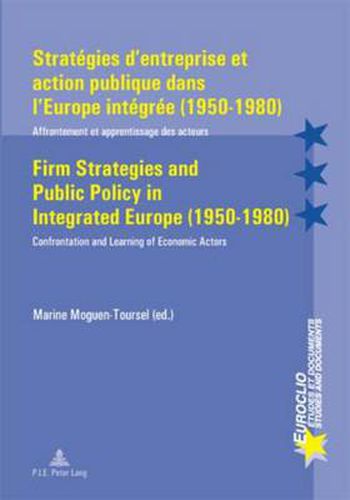Readings Newsletter
Become a Readings Member to make your shopping experience even easier.
Sign in or sign up for free!
You’re not far away from qualifying for FREE standard shipping within Australia
You’ve qualified for FREE standard shipping within Australia
The cart is loading…






Ce livre collectif s'appuie sur l'atelier pluridisciplinaire de jeunes chercheurs qui s'est tenu a Louvain-la-Neuve les 11-13 juin 2003. Il se penche sur des cas concrets dans les secteurs du transport routier, de l'informatique et des telecommunications des annees 1950 aux annees 1980. Il etudie la naissance difficile et conflictuelle d'une
expertise
des acteurs sur le terrain nouveau de l'Europe integree. Tandis que les entreprises decouvrent l'importance d'agir sur le processus de decision en marche, elles se voient attribuer une place dans cette concertation participative. Ce nouveau role necessite l'accumulation de competences techniques elargies et la multiplication de contacts avec les autres acteurs. Ensemble, ils participent a la delimitation du cadre communautaire (a travers l'elaboration des normes techniques, l'harmonisation de la fiscalite, la regulation des aides d'Etat, etc.) et entendent y defendre au mieux leurs interets. Cela peut etre l'occasion d'oppositions frontales, souvent difficiles a contourner. De nouveaux apprentissages sont alors necessaires pour tacher d'avancer dans l'harmonisation communautaire.
This collection of papers derives from the multidisciplinary workshop of young researchers which took place in Louvain-la-Neuve on 11-13 June 2003. It is based on actual case studies in the sectors of transport, data-processing and telecommunications between the 1950s and the 1980s. It analyses the long and difficult process for those involved in building expertise in the new field of an integrated Europe. At the same time as firms discovered the importance of influencing the decision-making process at work, they were given a place in this participative process. This new role implies the accumulation of enlarged technical competencies and the multiplication of contacts with other economic actors. Together, they have taken part in the demarcation of the Community framework, through the elaboration of technical standards, tax harmonisation, state aids regulation, and so on, and have defended their interests in this framework as best they could. This could provoke strong opposition, which was difficult to overcome. In this case, a process of learning and understanding was necessary on both sides in order to advance Community harmonisation.
$9.00 standard shipping within Australia
FREE standard shipping within Australia for orders over $100.00
Express & International shipping calculated at checkout
Stock availability can be subject to change without notice. We recommend calling the shop or contacting our online team to check availability of low stock items. Please see our Shopping Online page for more details.
Ce livre collectif s'appuie sur l'atelier pluridisciplinaire de jeunes chercheurs qui s'est tenu a Louvain-la-Neuve les 11-13 juin 2003. Il se penche sur des cas concrets dans les secteurs du transport routier, de l'informatique et des telecommunications des annees 1950 aux annees 1980. Il etudie la naissance difficile et conflictuelle d'une
expertise
des acteurs sur le terrain nouveau de l'Europe integree. Tandis que les entreprises decouvrent l'importance d'agir sur le processus de decision en marche, elles se voient attribuer une place dans cette concertation participative. Ce nouveau role necessite l'accumulation de competences techniques elargies et la multiplication de contacts avec les autres acteurs. Ensemble, ils participent a la delimitation du cadre communautaire (a travers l'elaboration des normes techniques, l'harmonisation de la fiscalite, la regulation des aides d'Etat, etc.) et entendent y defendre au mieux leurs interets. Cela peut etre l'occasion d'oppositions frontales, souvent difficiles a contourner. De nouveaux apprentissages sont alors necessaires pour tacher d'avancer dans l'harmonisation communautaire.
This collection of papers derives from the multidisciplinary workshop of young researchers which took place in Louvain-la-Neuve on 11-13 June 2003. It is based on actual case studies in the sectors of transport, data-processing and telecommunications between the 1950s and the 1980s. It analyses the long and difficult process for those involved in building expertise in the new field of an integrated Europe. At the same time as firms discovered the importance of influencing the decision-making process at work, they were given a place in this participative process. This new role implies the accumulation of enlarged technical competencies and the multiplication of contacts with other economic actors. Together, they have taken part in the demarcation of the Community framework, through the elaboration of technical standards, tax harmonisation, state aids regulation, and so on, and have defended their interests in this framework as best they could. This could provoke strong opposition, which was difficult to overcome. In this case, a process of learning and understanding was necessary on both sides in order to advance Community harmonisation.